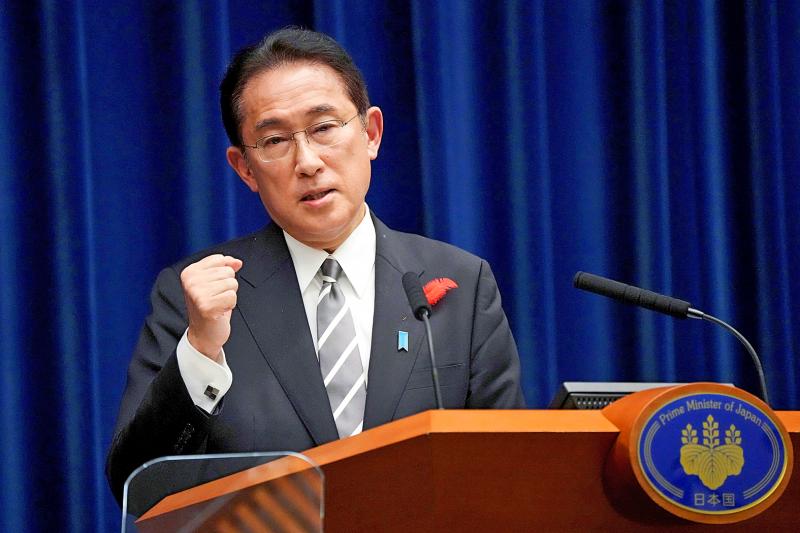Japanese Prime Minister Fumio Kishida yesterday dissolved the lower house of parliament, paving the way for elections on Oct. 31 that would be the country’s first of the COVID-19 pandemic.
At stake will be how Japan faces a potential COVID-19 resurgence and revives its battered economy, and if or how Kishida’s government can leave the shadow of nine years of rule under former Japanese prime minister Shinzo Abe and former Japanese prime minister Yoshihide Suga.
Kishida said he is seeking a mandate for his policies after being elected prime minister by parliament only 10 days ago.

Photo: Reuters
He replaced Suga, who lasted just a year as prime minister and whose support was battered by his perceived high-handed approach in dealing with COVID-19 and insistence on holding the Tokyo Olympics, despite rising virus cases.
Kishida, tasked with rallying support for the ruling party, has promised to pursue politics of “trust and empathy.”
Four main opposition parties have agreed to cooperate on some policies, such as addressing gaps between the rich and the poor, which they say widened during Abe’s government and were worsened by the pandemic.
After Japanese House of Representatives Speaker Tadamori Oshima announced the dissolution, the 465 lawmakers in the more powerful lower chamber stood up, shouted “banzai” three times and left. Official campaigning for all 465 newly vacant seats begins on Tuesday.
The previous House of Representatives election was in 2017 under Abe, a staunch conservative who pulled the long-ruling conservative Liberal Democratic Party (LDP) further to the right during his stint as Japan’s longest-serving prime minister.
In that vote, the LDP and its coalition partner New Komeito together won 310 seats, or two-thirds of the chamber.
Opposition parties have struggled to win enough votes to form a new government after the brief rule of the now-defunct Democratic Party of Japan from 2009 to 2012. With weaker LDP support under Suga, the party lost three parliamentary by-elections and a local vote this year to opposition contenders.
Yukio Edano, head of the Constitutional Democratic Party of Japan, the largest opposition party, told Japan Broadcasting Corp that he hopes to make the election “a first step toward changing the politics.”
In his first policy speech last week, Kishida promised to improve the country’s pandemic response, revive the economy, and bolster defenses against threats from China and North Korea.
He also sought to gradually expand social and economic activities by using vaccination certificates and more testing.
Yuichiro Tamaki, head of the Democratic Party for the People, said Kishida was selfish for dissolving the lower house so early in his tenure.
“It is unclear on what policies he is seeking a mandate from the voters,” Tamaki said.
He said his party would propose an economic policy that seeks higher pay for workers.
“We want to create a political situation where ruling and opposition blocs are in close competition,” Tamaki said.

SECURITY: As China is ‘reshaping’ Hong Kong’s population, Taiwan must raise the eligibility threshold for applications from Hong Kongers, Chiu Chui-cheng said When Hong Kong and Macau citizens apply for residency in Taiwan, it would be under a new category that includes a “national security observation period,” Mainland Affairs Council (MAC) Minister Chiu Chui-cheng (邱垂正) said yesterday. President William Lai (賴清德) on March 13 announced 17 strategies to counter China’s aggression toward Taiwan, including incorporating national security considerations into the review process for residency applications from Hong Kong and Macau citizens. The situation in Hong Kong is constantly changing, Chiu said to media yesterday on the sidelines of the Taipei Technology Run hosted by the Taipei Neihu Technology Park Development Association. With

CARROT AND STICK: While unrelenting in its military threats, China attracted nearly 40,000 Taiwanese to over 400 business events last year Nearly 40,000 Taiwanese last year joined industry events in China, such as conferences and trade fairs, supported by the Chinese government, a study showed yesterday, as Beijing ramps up a charm offensive toward Taipei alongside military pressure. China has long taken a carrot-and-stick approach to Taiwan, threatening it with the prospect of military action while reaching out to those it believes are amenable to Beijing’s point of view. Taiwanese security officials are wary of what they see as Beijing’s influence campaigns to sway public opinion after Taipei and Beijing gradually resumed travel links halted by the COVID-19 pandemic, but the scale of

A US Marine Corps regiment equipped with Naval Strike Missiles (NSM) is set to participate in the upcoming Balikatan 25 exercise in the Luzon Strait, marking the system’s first-ever deployment in the Philippines. US and Philippine officials have separately confirmed that the Navy Marine Expeditionary Ship Interdiction System (NMESIS) — the mobile launch platform for the Naval Strike Missile — would take part in the joint exercise. The missiles are being deployed to “a strategic first island chain chokepoint” in the waters between Taiwan proper and the Philippines, US-based Naval News reported. “The Luzon Strait and Bashi Channel represent a critical access

Pope Francis is be laid to rest on Saturday after lying in state for three days in St Peter’s Basilica, where the faithful are expected to flock to pay their respects to history’s first Latin American pontiff. The cardinals met yesterday in the Vatican’s synod hall to chart the next steps before a conclave begins to choose Francis’ successor, as condolences poured in from around the world. According to current norms, the conclave must begin between May 5 and 10. The cardinals set the funeral for Saturday at 10am in St Peter’s Square, to be celebrated by the dean of the College